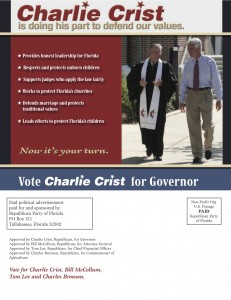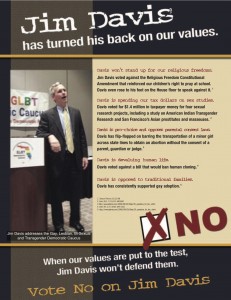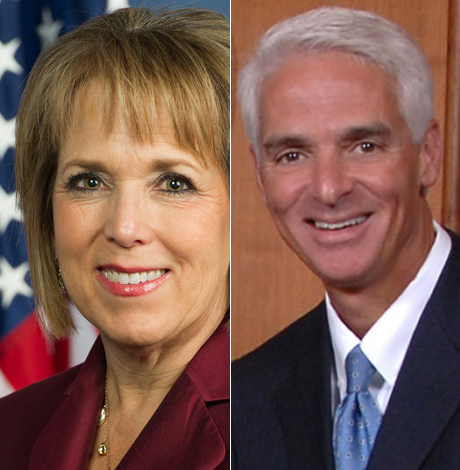Politics
Meek campaign slams Crist for ‘total flip’ on LGBT issues
In a statement provided to the Blade on Monday, the campaign for Democratic candidate Kendrick Meek hammered Crist and said he’s making a “total flip” on LGBT issues. The Meek campaign accused Crist, the current governor of Florida, of being willing to say anything to win election as a senator.
“Can anyone believe anything Charlie Crist says anymore?,” asked Abe Dyk, Kendrick Meek’s campaign manager. “It’s obvious Charlie Crist is willing to say anything. The only thing Charlie Crist says today that you can believe tomorrow is that he wants to be elected. The only thing we know about Charlie Crist’s track record is that he is a lifelong conservative Republican who has fought against every Democratic value. The governor’s charade trying to hide his lifelong conservative record just to get elected is an insult to every Floridian.”
On Sunday, the news website Raw Story published a leaked document outlining Crist’s support for an array of pro-LGBT bills pending before Congress, including repeal of “Don’t Ask, Don’t Tell” and the Employment Non-Discrimination Act. The article reports Crist intends to make these positions officially public as early as this week.
In response to this reporting, the Meek campaign maintains the Democratic candidate as a U.S. House member has been “on the front lines of the fight” for LGBT rights in the past while Crist has “stood in strong opposition.”
The campaign chides Crist for supporting “Don’t Ask, Don’t Tell” until earlier this year — after he made his bid as an Independent candidate for U.S. Senate — and for supporting Amendment 2 in Florida, which bans same-sex marriage and marriage-like unions in the state.
The Meek campaign touts how the Democratic candidate has been a co-sponsor of legislation that would repeal “Don’t Ask, Don’t Tell.” As a U.S. House member, Meek voted for an amendment on the House floor that would lead to repeal of the statute.
Additionally, the statement says Meek “stood against” Amendment 2 when it came before Florida voters in 2008 and voted for a version of ENDA in 2007.
A source with the Meek campaign said the Democratic candidate favors civil unions and opposes a U.S. constitutional amendment banning same-sex marriage while believing the marriage issue should be left up to the states.
Meek and Crist are competing in a three-way election this fall to win the open U.S. Senate seat in Florida. The Republican nominee in the race is Marco Rubio.
Rubio’s campaign didn’t immediately respond to the Blade’s request to comment on Crist’s reportedly new positions on pro-LGBT legislation.
UPDATE: The Meek campaign is making public a mailing from Crist’s 2006 gubernatorial campaign in which Crist criticizes his Democratic opponent Jim Davis for supporting the LGBT community.
The mailing, titled “Jim Davis has turned his back on our values,” shows a picture of Davis apparently speaking before Florida’s GLBT Democratic caucus. Additionally, the mailing says under the heading “Davis is opposed to traditional families” that “Davis has consistently supported gay adoption.”
The portion of the mailing promoting Crist states that he “Defends marriage and protects traditional values” and “Leads efforts to protect Florida’s children.”
Congress
Senate parliamentarian orders removal of gender-affirming care ban from GOP reconciliation bill
GOP Senate Leader John Thune (S.D.) hoped to pass the bill by end-of-week

Restrictions on the use of federal funds for gender-affirming care will be stripped from the Republican-led Senate reconciliation bill, following a ruling by the Senate parliamentarian on Tuesday that struck down a number of health related provisions.
The legislation banned coverage for transgender medical care through Medicaid and the Children’s Health Insurance Program, language that was also included in the House version of the bill passed on May 22 with a vote of 215-214.
The parliamentarian’s decision also rejected Republican proposals for a Medicaid provider tax framework, which allows states to charge health care providers and use the funds to support their programs, along with broader cuts to Medicaid.
Amid calls to override Tuesday’s ruling from Republicans like U.S. Rep. Greg Steube (Fla.), GOP Senate Majority Leader John Thune (S.D.) told reporters “That would not be a good outcome for getting a bill done.”
He also acknowledged that the timing and schedule might have to be adjusted. Senate Republicans had hoped to pass the reconciliation bill by the end of this week, though this was not a legal or procedural deadline.
Dubbed the “one big, beautiful bill” by President Donald Trump, the legislation would extend tax breaks from 2017 that overwhelmingly benefit the wealthiest Americans and corporations. To cover the cost, which is estimated to exceed $4 trillion over 10 years, the bill would make drastic cuts to social welfare programs, particularly Medicaid.
Democrats are not in a position to negotiate across the aisle with Republicans holding majorities in both chambers of Congress, but for months they have been calling attention to the effort by their GOP colleagues to strip Americans of their health insurance to pay for the tax breaks.
The Congressional Budget Office estimates that 10.9 million people would lose their coverage, either through Medicaid or the Affordable Care Act marketplaces. Some Republicans like U.S. Sen. Josh Hawley (Mo.) are pushing back against the deep cuts to Medicaid, arguing they would be devastating for many of their constituents and also to hospitals, nursing homes, and community health care providers in rural areas.
In a statement emailed to the Washington Blade on Tuesday, U.S. Senate Democratic Whip Dick Durbin (Ill.) said, “Anti-trans extremists are attempting to use the full power of the government to hurt kids, and recent Supreme Court decisions in Skrmetti and Medina are enabling their quest.”
While today’s ruling by the Senate parliamentarian is a temporary win, I will keep pushing back on these shameful attempts to harm trans kids and their families for trying to live authentically,” said the senator, who also serves as ranking member of the powerful Senate Judiciary Committee.
U.S. Rep. Mark Takano (D-Calif.), who is gay and chairs the Congressional Equality Caucus, also shared a statement with the Washington Blade addressing the parliamentarian’s ruling:
“This ruling by the Senate Parliamentarian is a win for the transgender people who rely on Medicaid and CHIP to access the healthcare they need to live fuller, happier, and healthier lives—but the fight is not over yet,” the congressman said.
“Republican Senators must abide by her ruling and remove the ban from the final version of Trump’s Big Ugly Bill,” he said. “Yet, even with this provision removed, this bill is terrible for the American people, including trans Americans. Every Equality Caucus member voted against it in the House and we’re ready to do so again if the Senate sends it back to the House.”
The Human Rights Campaign issued a press release with a statement from the organization’s vice president for government affairs, David Stacy:
“The fact remains that this bill belongs in the trash. It continues to include devastating cuts to health care programs — including Medicaid — that would disproportionately harm the LGBTQ+ community, all so the already rich can receive huge tax cuts,” Stacy said.
“While it comes as a relief that the Senate parliamentarian concluded that one provision in the nightmarish reconciliation bill that would have denied essential, best practice health care to transgender adults does not belong, we aren’t done fighting,” he said. “With attacks on our community coming from many directions, including the Supreme Court, we will work to defeat this bill with everything we’ve got.”
Congress
Murkowski, Shaheen reintroduce Global Respect Act
Bill would sanction foreign nationals who commit anti-LGBTQ human rights abuses

U.S. Sens. Lisa Murkowski (R-Alaska) and Jeanne Shaheen (D-N.H.) on Wednesday once again introduced a bill that would sanction foreign nationals who carry out human rights abuses against LGBTQ and intersex people.
The two senators have previously introduced the Global Respect Act. Co-sponsors include U.S. Sens. Chris Van Hollen (D-Md.), Chris Murphy (D-Conn.), Jeff Merkley (D-Ore.), Cory Booker (D-N.J.), Peter Welch (D-Vt.), Brian Schatz (D-Hawaii), Edward Markey (D-Mass.), Tammy Baldwin (D-Wis.), and Ron Wyden (D-Ore.)
“Around the world, individuals who are part of the LGBTQ+ community are in danger for simply existing,” said Murkowski in a press release. “Hate and violence cannot and should not be tolerated. I’m hopeful that this legislation will establish actionable consequences for these inexcusable human rights violations, and create a safer world for all people — regardless of who they are or who they love.”
Shaheen in the press release notes “the risk of personal harm for LGBTQI individuals for publicly identifying who they are or expressing who they love has tragically increased in recent years.”
“Human rights, as defined by the Universal Declaration of Human rights, recognizes that global freedom, justice, and peace depend on ‘the inherent dignity’ and ‘the equal and inalienable rights of all members of the human family,” said the New Hampshire Democrat. “LBGTQI human rights are universal human rights. We must ensure that we hold all violators of those rights accountable.”
The promotion of LGBTQ and intersex rights abroad was a cornerstone of the Biden-Harris administration’s foreign policy.
The current White House has suspended most foreign aid. The elimination of these funds has left the global LGBTQ and intersex rights movement reeling.
Congress
Garcia elected top Democrat on the House Oversight Committee
Gay Calif. lawmaker vows to hold Trump-Vance administration accountable

U.S. Rep. Robert Garcia (D-Calif.) on Tuesday was elected top Democrat on the House Oversight Committee in a vote that signaled the conference’s overwhelming support for a newer voice on Capitol Hill who will play a key role taking on President Donald Trump.
With a margin of 150-63, the 47-year-old openly gay congressman defeated U.S. Rep. Stephen Lynch (D-Mass.), alongside U.S. Reps. Jasmine Crockett (D-Texas) and Kweisi Mfume (D-Md.) who exited the race after the House Democratic Steering and Policy Committee backed Garcia.
Serving only since 2023, the congressman has had a remarkably quick ascent leading up to his election this week as ranking member of one of the most powerful House committees, awarded a leadership position serving under House Democratic Whip Katherine Clark (Mass.) and selected as a co-chair of former Vice President Kamala Harris’s 2024 presidential campaign.
Democratic members began jockeying for the top seat on the oversight committee this spring after the late-U.S. Rep. Gerry Connolly of Virginia stepped away amid news that his esophageal cancer had returned. He died in May.
Connolly last year fended off a challenge from one of the most well known House Democrats, U.S. Rep. Alexandria Ocasio-Cortez (N.Y.), though with a narrower margin that signaled intra-party tensions over whether leadership roles should still be awarded based on seniority.
Garcia positioned himself as a bridge between the two camps — a consensus candidate with executive managerial experience as the former mayor of Long Beach, Calif. At the same time, particularly since the start of Trump’s second term, the congressman has emerged as one of the most outspoken critics of the new Republican regime.
In a statement on X Tuesday, Garcia thanked his colleagues and promised to “hold Donald Trump and his administration accountable.”
I'm honored to have been elected by @HouseDemocrats to serve as Ranking Member on @OversightDems.
— Congressman Robert Garcia (@RepRobertGarcia) June 24, 2025
We will hold Donald Trump and his Administration accountable for their corruption – and work to make our government more effective for the American people.
Let's get to work.
If Democrats win control of the House next year, the oversight committee will be able to exercise powers that are now available only to Republicans under the chair, U.S. Rep. James Comer (R-Ky.), which include the authority to investigate virtually any matter across the federal government, to issue subpoenas, and to compel testimony.
In the meantime, Garcia on Monday promised that Democrats on the committee would “vigorously fight” Republican Speaker Mike Johnson’s (La.) plans “to dismantle the Government Accountability Office.”
-

 U.S. Supreme Court3 days ago
U.S. Supreme Court3 days agoSupreme Court upholds ACA rule that makes PrEP, other preventative care free
-

 U.S. Supreme Court3 days ago
U.S. Supreme Court3 days agoSupreme Court rules parents must have option to opt children out of LGBTQ-specific lessons
-

 India5 days ago
India5 days agoIndian court rules a transgender woman is a woman
-

 National4 days ago
National4 days agoEvan Wolfson on the 10-year legacy of marriage equality












